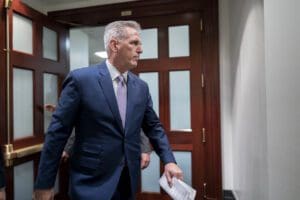House Republicans pass bill that would slash climate investments and safety net programs
The House GOP caucus has refused to offer a bill to raise the debt ceiling without demands for budget cuts.

The Republican-controlled House of Representatives passed a bill on Wednesday by a vote of 217-215 to repeal much of the Inflation Reduction Act’s historic investments in clean energy infrastructure and measures to combat climate change. The bill would also cut $4.5 trillion in federal spending over the next decade. A top economic analytics company is warning that if the bill becomes law, it will likely cost 780,000 jobs and possibly spur a recession.
The Limit, Save, Grow Act of 2023, sponsored by House Budget Committee Chair Jodey Arrington, would pair an array of spending cuts and Republican policy priorities with a $1.5 trillion increase in the debt ceiling.
Without immediate action to increase the current $31.5 trillion borrowing cap, analysts predict a default on the nation’s existing debt in early June. President Joe Biden and congressional Democrats have urged a bill to raise the debt limit with no strings attached, but House Speaker Kevin McCarthy has refused to bring such a bill to the House floor.
Instead, he and the House Republican caucus proposed a 320-page bill rescinding most of the $369 billion in climate change and clean energy funding included in Biden’s 2022 Inflation Reduction Act, killing Biden’s plan to forgive student loan debt, canceling unused pandemic relief funds, making it harder for low-income families to access safety net programs, and cutting funding for federal agencies.
The bill includes a GOP-backed plan to roll back funding for the Internal Revenue Service to modernize and to crack down on corporations and wealthy individuals who do not pay what they owe in taxes. If enacted, those provisions would cost the government more than $100 billion in lost revenue over a decade, according to the nonpartisan Congressional Budget Office.
It also contains the Republicans’ Lower Energy Costs Act, a series of anti-climate bills, including measures to boost oil and gas drilling and to eliminate environmental protections.
“These proposals would really be locking us into just decades of dirty, volatile fossil fuels and really kind of perpetuate the environmental injustices that have already occurred, particularly to front-line and marginalized communities,” America Fitzpatrick, conservation program director at the League of Conservation Voters, told the American Independent Foundation in March. “I think it’s clear these are giveaways to their oil and gas industry friends.”
A report published in March by the United Nations Intergovernmental Panel on Climate Change, an international group of scientists charged with examining climate change and its impacts, warned that without immediate reductions in greenhouse gas emissions, the consequences for humanity will be dire.
Moody’s Analytics, an economic research service, examined the likely macroeconomic impacts of the bill and predicted it would harm the economy:
The Limit, Save, Grow Act of 2023 would cut into near-term economic growth if passed into law. Compared with a scenario that includes a clean debt limit increase and no other significant changes to fiscal policy under current law, real GDP in the year ending in the fourth quarter of 2024 would be 0.65 percentage point lower. … That is, in the Clean Debt Limit scenario, real GDP is expected to grow 2.25% in the year compared with 1.6% if Speaker McCarthy’s legislation becomes law. While the economy skirts recession in both scenarios, recession risks are uncomfortably high, with a consensus of economists and many investors and business executives expecting a downturn beginning late this year or early next. … Compared with the Clean Debt Limit scenario, by year-end 2024, employment is 780,000 jobs lower, and the unemployment rate is 0.36 percentage point higher.
On Tuesday night, Republican leaders reportedly broke their promise not to make changes to the bill, agreeing to demands by Iowa Republicans that some biofuel tax incentives be kept, protecting their state’s ethanol industry.
Ben LaBolt, the White House communications director, said in a statement on Wednesday:
Speaker McCarthy has cut a deal with the most extreme MAGA elements of his party to accelerate taking food assistance from hundreds of thousands of older Americans and to carve out one industry from his draconian cuts without making a single change to provisions that will strip away health services for veterans, cut access to Meals on Wheels, eliminate health care coverage for millions of Americans, and ship manufacturing jobs overseas.
In a Statement of Administration Policy released on Tuesday, the Biden administration promised that the president will veto the bill if it makes it to his desk: “The Administration strongly opposes the Limit, Save, Grow Act of 2023, which is a reckless attempt to extract extreme concessions as a condition for the United States simply paying the bills it has already incurred. The President has been clear that he will not accept such attempts at hostage-taking.”
But that is unlikely to happen, given that Democrats control the Senate.
In a floor speech on Tuesday, Majority Leader Chuck Schumer said the bill would be dead on arrival in the chamber.
“It might as well be called the Default On America Act, because that’s exactly what it is: DOA. Instead of doing what both sides have done many times before, avoiding default without preconditions, Speaker McCarthy and House Republicans want to force working Americans to accept either a punch to the gut or a blow to the head,” the New York Democrat said. “Either the U.S. defaults on national debt for the first time in American history or MAGA Republicans get their way and America defaults on everything else.”
Published with permission of The American Independent Foundation.
Recommended

U.S. House Speaker Johnson says IVF should be protected — just not by Congress
U.S. House Speaker Mike Johnson said Thursday that it’s up to states and not Congress to preserve access to in vitro fertilization, weighing in on a growing national debate and campaign issue.
By Jennifer Shutt, States Newsroom - March 14, 2024
Biden calls for expanded child tax credit, taxes on wealthy in $7.2 trillion budget plan
President Joe Biden released his budget request for the upcoming fiscal year Monday, calling on Congress to stick to the spending agreement brokered last year and to revamp tax laws so that the “wealthy pay their fair share.”
By Jennifer Shutt, States Newsroom - March 11, 2024
Telehealth abortions on the rise since Dobbs, new report shows
Researchers studying national abortion trends found that in the 15 months since Roe v. Wade fell, abortion rates remained elevated despite more limited access throughout the U.S., according to the Society of Family Planning’s latest #WeCount report published Wednesday.
By Sofia Resnick, States Newsroom - February 28, 2024









































































